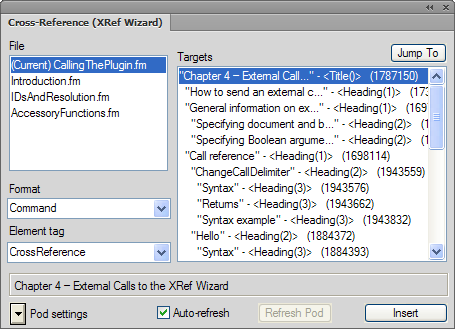
XRef Wizard
(Purchase/Download Trial).
The XRef Wizard plugin provides a variety of functions
associated with structured cross-references, including:
- ID control - With the Wizard, you can control the IDs used for your
cross-references. For each cross-reference inserted, you can accept the
FrameMaker auto-generated ID, or use virtually any other ID you want.
- Automatic cross-reference adjustment after a unique ID change -
With the Wizard tools, you can change a unique ID on an element,
then allow the plugin to automatically adjust any existing cross-references that target the element.
Without this functionality, changing an ID would break any existing cross-references that target it.
- Bookwide resolution based on IDs
alone - Along with ID control, the Wizard can perform bookwide sweeps to
resolve cross-references based on ID alone. Normally, a FrameMaker
cross-reference is limited by the file reference, such that it will become
broken if you move the target to another file. With the Wizard, you can
overcome this limitation and look anywhere in a book to resolve
cross-references, based on ID.
- Cross-reference search, based on a given target -
You can right-click on any potential cross-reference target and search an
entire book for cross-references that target it.
- Automatic setting of unique IDs - The
Wizard can sweep an entire document or book and set unique ID attributes for selected elements.
This action can be performed manually or in response to certain triggers, such as saving a document.
- Bookwide ID "uniquification" - The
Wizard can sweep an entire book and replace any duplicate unique ID values
between files. FrameMaker forces unique IDs to be unique within a file, but
not between files in a book. If you have difficulties with unique IDs
between files, especially related to XML/SGML export, this feature may be
particularly helpful.
Additionally, the Wizard provides an optional cross-reference insertion
pod that may be used in place of the native pod. While it has a similar operation and purpose
to the native pod, it includes a variety of time-saving and usability enhancements, such as:
- The ability to list multiple elements in the potential targets list, including the ability to represent their hierarchy. With the native pod, you must select a single element at a time, making it more difficult to browse the complete list of potential targets in a single document.
- For the target file selection, the use of a scrollbox rather than a dropdown list, which makes it easier to select the file.
- The ability to customize how potential targets are represented in the targets list. With the native pod, you are limited to a single representation of paragraph numbering, EDD prefixes, and the element text. With the Wizard pod, you can completely customize how targets appear, with the inclusion of element text, numbering, static text, and other parameters in any configuration.
- When cross-referencing an element that currently has no ID assigned, the optional ability to control which ID is assigned to complete the action.
- A better memory of previously-selected parameters. For example, the selected target file remains persistent after inserting cross-references and switching active documents, unlike the native pod that always reverts to the current document. Additionally, the pod remembers the most recently-selected target in the targets list, per document.
- A clear indication when you select a cross-reference that targets a file that is currently closed.
- A variety of additional settings that allow strict customization of its behavior.

A primary vision for the Wizard is to provide tools for
cross-reference management within a scheme of granular content reuse. If you
frequently move content between files, especially with a plugin such as FrameSLT,
you may have problems with broken cross-references. As mentioned earlier, a
cross-reference becomes broken if its target is moved to another file, and
FrameMaker is not able to resolve that situation with native tools. With the
Wizard, however, you can move cross-references and targets between files at
will, and resolve them afterwards based on their ID links alone.
Even if you do not engage in heavy content reuse, the Wizard has
features that may make cross-reference management easier. To download a free, fully-functional trial version of
the XRef Wizard, click
here. The trial version has no time
limit, but will occasionally "inform" you that it is indeed a trial
version.
Note that the Wizard operates on structured
cross-references only; that is, cross-references wrapped in structural elements.
Also, note that this plugin does not intend to suggest that there is anything wrong with cross-reference
functionality in FrameMaker. It is simply an enhancement tool for a variety of purposes.


